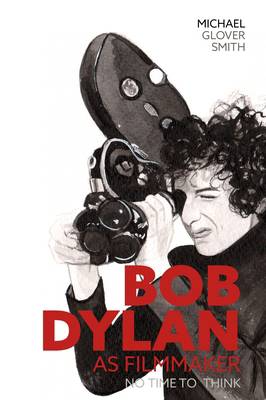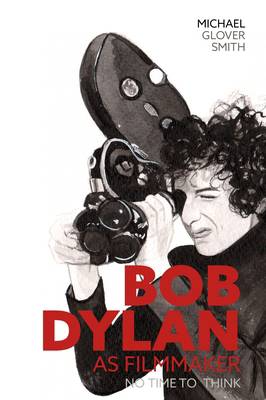
- Afhalen na 1 uur in een winkel met voorraad
- Gratis thuislevering in België vanaf € 30
- Ruim aanbod met 7 miljoen producten
- Afhalen na 1 uur in een winkel met voorraad
- Gratis thuislevering in België vanaf € 30
- Ruim aanbod met 7 miljoen producten
Zoeken
Omschrijving
"Michael Glover Smith's Bob Dylan as Filmmaker is the most compelling reconsideration of Bob Dylan's work as a filmmaker written to date." -- Erin C. Callahan, author of The Politics and Power of Bob Dylan's Live Performances
A deep dive into one of the most overlooked -- and fascinating -- sides of the 2016 Nobel Prize in Literature winner: Bob Dylan, the filmmaker. While his music and lyrics have been studied endlessly, his work behind (and in front of) the camera remains largely unexplored. No other book has taken this angle, and with Dylan's legend still growing, the audience is more than ready for a bold new take. Bob Dylan as Filmmaker, the first book of its kind, opens up exciting new ways to think about the artistry of Bob Dylan. It offers a captivating exploration into movies that, according to Michael, showcase Bob Dylan not just as a subject, but as the primary author. These include Eat the Document--a short, experimental television film shot in 1966 and released in 1972; the sprawling, genre-blurring epic Renaldo and Clara (1978), both directed by Dylan himself; and the darkly surreal Masked and Anonymous (2003), directed by Larry Charles but co-written by and starring Dylan. Bob Dylan as Filmmaker explores what these movies reveal about "how it feels" to be Bob Dylan during three defining eras of his career: the revolutionary 1960s, the introspective 1970s, and the enigmatic early 2000s. Just as crucially, they illuminate Dylan's remarkable instinct for using film not merely as a medium, but as a deeply personal mode of expression. The book also provides an essential survey of Dylan's most recent movie projects, including those by other directors, in which Dylan's influence is less overt but no less powerful. Here, Michael argues that Dylan operates as a kind of "invisible co-author" in Martin Scorsese's Rolling Thunder Revue (2019), where Dylan appears as a slippery, self-mythologizing interviewee; Alma Har'el's haunting Shadow Kingdom (2021), a stylized livestream performance; and James Mangold's A Complete Unknown (2024), the Timothée Chalamet-led biopic shaped in part by Dylan's behind-the-scenes "script approval."
A deep dive into one of the most overlooked -- and fascinating -- sides of the 2016 Nobel Prize in Literature winner: Bob Dylan, the filmmaker. While his music and lyrics have been studied endlessly, his work behind (and in front of) the camera remains largely unexplored. No other book has taken this angle, and with Dylan's legend still growing, the audience is more than ready for a bold new take. Bob Dylan as Filmmaker, the first book of its kind, opens up exciting new ways to think about the artistry of Bob Dylan. It offers a captivating exploration into movies that, according to Michael, showcase Bob Dylan not just as a subject, but as the primary author. These include Eat the Document--a short, experimental television film shot in 1966 and released in 1972; the sprawling, genre-blurring epic Renaldo and Clara (1978), both directed by Dylan himself; and the darkly surreal Masked and Anonymous (2003), directed by Larry Charles but co-written by and starring Dylan. Bob Dylan as Filmmaker explores what these movies reveal about "how it feels" to be Bob Dylan during three defining eras of his career: the revolutionary 1960s, the introspective 1970s, and the enigmatic early 2000s. Just as crucially, they illuminate Dylan's remarkable instinct for using film not merely as a medium, but as a deeply personal mode of expression. The book also provides an essential survey of Dylan's most recent movie projects, including those by other directors, in which Dylan's influence is less overt but no less powerful. Here, Michael argues that Dylan operates as a kind of "invisible co-author" in Martin Scorsese's Rolling Thunder Revue (2019), where Dylan appears as a slippery, self-mythologizing interviewee; Alma Har'el's haunting Shadow Kingdom (2021), a stylized livestream performance; and James Mangold's A Complete Unknown (2024), the Timothée Chalamet-led biopic shaped in part by Dylan's behind-the-scenes "script approval."
Specificaties
Betrokkenen
- Auteur(s):
- Uitgeverij:
Inhoud
- Aantal bladzijden:
- 244
- Taal:
- Engels
Eigenschappen
- Productcode (EAN):
- 9780857162991
- Verschijningsdatum:
- 2/03/2026
- Uitvoering:
- Paperback
- Formaat:
- Trade paperback (VS)
- Afmetingen:
- 127 mm x 193 mm
- Gewicht:
- 246 g

Alleen bij Standaard Boekhandel
+ 45 punten op je klantenkaart van Standaard Boekhandel
Beoordelingen
We publiceren alleen reviews die voldoen aan de voorwaarden voor reviews. Bekijk onze voorwaarden voor reviews.








